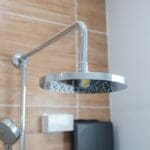Imagine stepping into your shower, the gentle downpour from your rain shower head enveloping you in a warm, comforting embrace. It’s a luxurious experience that hinges significantly on how far your shower head is from the wall.
Experts suggest a distance of 9 to 18 inches, whether it’s wall-mounted or dangling from the ceiling. This precise spacing prevents the shower area from feeling cramped or causing unwanted splashing outside your shower zone.
However, the ideal distance isn’t a one-size-fits-all matter; it’s influenced by several factors including the size of your shower head, the height and shape of your bathroom, and the type of your shower enclosure.
To ensure you’re making the most out of your rain shower head, it’s crucial to understand these variables and how they play into the perfect placement for your specific setup. Discovering the right balance can elevate your showering experience to new heights, so let’s explore how to achieve that perfect harmony in your bathroom sanctuary.
Key Takeaways
- Ideal distance from the wall: 9 to 18 inches
- Consider factors like shower enclosure type and bathroom layout
- Placement tips for different bathrooms: width, ceiling height, and design considerations
- Determine the right height based on tallest person, adjustable height shower heads.
Understanding Rain Shower Heads
To effectively choose the placement of your rain shower head, you’ll need to consider factors such as its width, design, your bathroom’s height, and overall layout. Rain shower heads often emulate a natural rainfall, providing a unique showering experience that’s both luxurious and relaxing. When deciding on placement, it’s crucial to ensure that the water can flow directly over you, allowing you to enjoy the full rainfall effect.
The decision between wall-mounted and ceiling-mounted rain shower heads depends on your bathroom’s shape and size. A wall-mounted Rain Shower Head might suit smaller bathrooms better, as it doesn’t require high ceilings. Conversely, a ceiling-mounted option can provide a more immersive rainfall experience, especially in larger bathrooms with ample height.
Additionally, the type of enclosure, be it an open shower area or one with a glass enclosure, impacts where you should install your rain shower head. Optimal placement involves standing in the shower area and making a 360-degree turn to assess the best spot, ensuring the water envelops you directly without splashing out of the shower area. This practical approach guarantees a satisfying and efficient use of your rain shower head.
Ideal Distance From the Wall
When positioning your rain shower head, it’s crucial to keep it at least 9 to 18 inches away from the wall to avoid a cramped shower space and reduce splashing. This ideal distance from the wall ensures that your shower stall feels open and inviting. The placement of a rain shower head directly impacts your ability to move freely and stand comfortably without bumping into walls or fixtures.
Centering the shower head after subtracting 20 inches from the overall dimensions of your showering area offers a practical guide for achieving the right distance from the wall. This method ensures that the rain shower heads are optimally positioned to enhance your shower experience.
Moreover, if you’re using a shower arm to install the shower head, opting for one that’s at least 9 inches in length will further ensure that the shower head is adequately away from the wall.
Factors Influencing Placement
Why should you consider the width of your rain shower head? The size directly impacts its placement and how far it should be from the wall to provide the best coverage and experience. When selecting rain shower heads, several factors influencing placement come into play, ensuring you get the most out of your shower.
Firstly, the height of the bathroom is crucial. A higher ceiling might accommodate a ceiling-mounted shower head better, offering a more authentic rain-like experience. Conversely, if the ceiling is lower, a wall-mounted rain shower might be more feasible, requiring careful consideration of the shower arm’s length to position the head adequately away from the wall.
The shape of your bathroom also dictates whether a wall-mounted or ceiling-mounted shower head is more suitable. Additionally, the type of shower enclosure you have, be it an open shower or one with a glass enclosure, can influence the placement. It’s vital to consider these elements to ensure the rain shower head fits perfectly within the space.
Lastly, adopting a practical approach by testing the shower head position before the final installation can save you from future adjustments. This step ensures the chosen spot reflects the ideal height of the shower and distance from the wall, considering all factors influencing placement.
Placement Tips for Different Bathrooms
Choosing the ideal placement for your rain shower head in different bathrooms requires considering several key factors, including width, height, and enclosure type. These elements are crucial for ensuring you experience the comfort of a rain shower without causing water damage to your bathroom floor.
Here are placement tips to keep in mind:
- Consider the width of the rain shower head: Ensure there’s enough room between the wall and the shower head to avoid splashing water outside the shower area.
- Height matters: Adjust the placement based on the bathroom’s ceiling height to optimize water flow and coverage.
- Wall vs. ceiling-mounted rain shower heads: The shape of your bathroom can help decide whether a wall-mounted or ceiling-mounted option is better.
- Enclosure type: The design of your shower enclosure, be it open or with a glass barrier, influences the placement to prevent water from escaping.
- Practical testing: Stand in the shower area and make a 360-degree turn. This method helps to visualize if there’s sufficient space for a comfortable shower without water spraying onto the bathroom floor unnecessarily.
Following these placement tips for different bathrooms will enhance your showering experience while safeguarding against potential water damage.
Determining the Right Height
After considering placement tips for different bathrooms, it’s crucial to determine the right height for your rain shower head to ensure an optimal showering experience. Start by considering the height of the tallest person using the shower. This step is fundamental in determining the right height, as it prevents anyone from having to duck under the shower head or feel crowded during use.
The rain shower head should be installed at least 9 to 18 inches away from the wall. This distance is key to avoiding water splashing outside the shower area and ensures the flow of water is uninterrupted. Positioning the shower head too close to the wall can lead to water bouncing off the wall and potentially creating a mess outside the shower zone.
Additionally, the size and shape of your shower area play a significant role in determining the optimal placement. You’ll want to ensure that the spray of water can encompass the user without them bumping into the wall. Consider adjustable height shower heads as a versatile solution to accommodate users of different heights.
Frequently Asked Questions
How Far Should Rain Shower Head Be From Wall?
Your rain shower head should be 9 to 18 inches from the wall, considering its width and your bathroom’s height. Adjust it to avoid water splashing out, catering to everyone’s needs and preferences.
Where Should the Rain Head Be Placed in a Shower?
You should place your rain head in the shower’s center, considering the tallest user’s height and the enclosure’s size. Ensure it’s not too close to the wall for a comfortable, well-covered shower experience.
What Is the Standard Mounting Height for a Rain Shower Head?
You should mount your rain shower head 80 to 84 inches above the bathroom floor. This height considers the tallest person using the shower, ensuring it’s comfortable for everyone. Adjustable options are available too.
How Far Should a Shower Head Be?
Your shower head should be 9 to 18 inches from the wall, ensuring enough space and comfort. Consider the shower’s size and the head’s width, and place it centrally or comfortably above your head.





